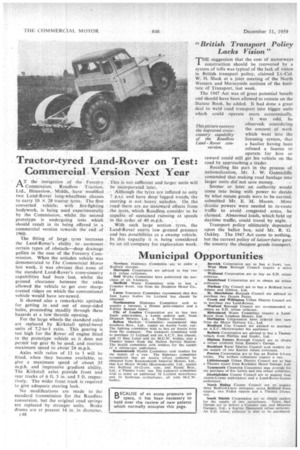"British Transport Policy Lacks Vision"
Page 84

If you've noticed an error in this article please click here to report it so we can fix it.
THE suggestion that the cost of motorways construction should be recovered by a system, of tolls was typical of the lack of vision in British. transport policy, claimed Lt.-Col. W. H. Slack at a joint meeting of the North Western and Merseyside sections of the Institute of Transport, last week.
The 1947 Act was of great potential benefit and should have been allowed to remain on the Statute Book, he added. It had done a great deal to weld road transport into bigger units which could operate more economically.
It was odd, he observed, considering the amount of work which went into the licensing system, that a haulier having been refused a licence to operate for hire or reward could still get his vehicle on the road by approaching a trader.
Recalling his part in the process of nationalization, Mr. J. W. Gannicliffe contended that making road haulage into
larger units did-not save money. .
Sooner. or later an authority .would come into being with power to decide by what means goods were to be carried, submitted Mr. E. M. Mason. More -drastic powers were needed to re-route traffic to avoid congested areas, he claimed. Abnormal loads, which held up daytime traffic, could travel by night.
Transport policyultimately, depended upon the ballot box,. said Mr. R. G. Oakley. The 1947 Act came to nothing, but the current policy of laisser-faire gave the country the cheapest goods transport.
This picture conveys the improved crosscountry capability of the Roadless Land Rover con version.
























































































































